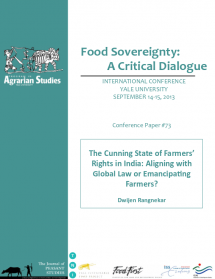The Cunning State of Farmers’ Rights in India Aligning with Global Law or Emancipating Farmers?
Global rules concerning dispositional rights in plant varieties present a highly complex architecture with contrasting and, no doubt, conflicting norms and principles. And these tensions emerge from and translate into domestic laws and regulations – and, of course, return to haunt these varied forums.

Authors
In this respect, the residual flexibility in TRIPS Article 27.3(b) provides WTO Member countries opportunities to imaginatively explore the international architecture and outer contours of a sui generis system.
Marking an important watershed in translating some of the rhetoric that circulates at the different multilateral forums – and within social movements and farmer groups – into domestic law is India’s Protection of Plant Varieties and Farmers’ Rights Act. This delivers farmers’ rights into national law for the very first time globally (and historically).
A watershed heralded by MS Swaminathan, who commented that “India’s law is unique in the sense that it is the first time anywhere in the world that the rights of both breeders and farmers have received integrated attention” (Swaminathan 1998). For Olivier de Schutter, the UN Special Rapporteur on the Right to Food, India’s legislative architecture stands alongside the Africa Model Law as singular acts of resistance to deepening proprietary claims in plant genetic resources (de Schutter 2009).
The drafting history of this piece of legislation is highly contentious – capturing the very idea of lawfare in all its vicissitudes and dimensions. Proposals for rights for breeders circulated in the shadows of GATT negotiations in 1980s. Yet, one draft and another came and went without being enacted. Activists and civil society interlocutors have themselves participated in (formal) legislative drafting – and, have also distanced themselves from the outcomes. The very idea of farmers’ rights has circulated in a number of different spaces and places, including articulations from People’s Tribunals, statements from peasant and farming collectives, and international fora as well.
Constituted through these different aspirations, the rights encompass political dimensions whilst also having specific material and cultural aspects. Interrogating the architecture of law that has been enacted – and its operation – the paper seeks to explore whether the aspirations for a farmers’ right have been fulfilled. In doing so, it finds that legal architecture and its operation are indicative of a cunning state – a state that is able to distribute its responsibilities and negotiate away its commitments to particular constituencies.
The cunningness is evidenced by the illusionary elements of the rights that have been formulated. This argument will be closed through a political account of the ‘cognitive capture’ and epistemic lock-in that appears in administrating intellectual property rights in plant genetic material.
The paper begins with discussion of the manner in which agriculture is transformed by capital – or at least, the dual effects of appropriation and substitution. This 1 Note: The paper is a working draft; neither for further circulation nor citation. Comments and observations are graciously welcomed. forms an element towards explaining how and why seed rights are constituted and constantly diminished.
The paper proceeds to critically evaluate the construction of farmers rights in the Indian legal system – noting three characteristic dimensions: authorial recognition, collective rights and seed rights. Therein, noting the complicated negotiating history, I draw out certain problems with the construction of farmers rights.
Thereafter, in the final section, I present an argument that the legal architecture – and its operation – are testimony to a cunning state.
Dwijen Rangnekar, Associate Professor of Law, School of Law, University of Warwick Professor Rangnekar’s research focuses on the intellectual property rights; thus, probing the construction of standards and their contested globalisation. His recent publications include Geneva Rhetoric, National Reality: The Political Economy of Introducing Plant Breeders’ Rights in Kenya (New Political Economy), Re-making place: the social construction of a geographical indication for Feni (Environment and Planning A), and The Glivec Precedent – The Supreme Court Judgement: Lawmaking in the South (Economic and Political Weekly). He is currently working on a monograph, titled Re-Making Place: The Social Construction of Geographical Indications (Palgrave Macmillan).
Food Sovereignty: a critical dialogue, 14 - 15 September, New Haven.